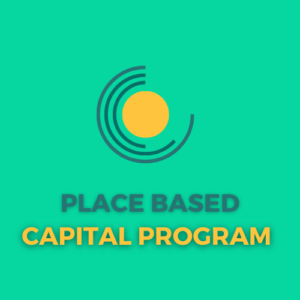Past and Current Work
Ethical Fields has worked with a variety of partners to bring community wealth building and place based capital initiatives to life.
Explore some of our past and current works here.
Place Based Capital and Community Funding Models
Place Based Capital and Community Funding Models
We support communities and organisations to embed place based capital principles within their local place and their initatives, by building capacity, exploring new ways to create and source local capital and designing unique innovative funding models. Some examples of our work include:
 Place Based Capital Program and Network
Place Based Capital Program and Network
The Place Base Capital Initiative and Network was launched in 2023. It brings together over 20 places and partners, from councils and development agencies to business and community organisations, seeking to collectively scale the Place Based Capital ecosystem across Australia. Over the past 12 months, the program has built awareness, inspiration and capability around Place based capital models and practices, undertaken place based and industry research around barriers, enablers and the system change required for activating place based capital, and has begun to test and develop practical models, tools and frameworks. The initiative is convened hosted by Ethical Fields.
See here for more information, or to view our Partners and Collaborators
 Redesigning the Funding Model for Logan Together
Redesigning the Funding Model for Logan Together
Logan Together is a leader in place based approaches, bringing community, government, funders and the service sector together to see Logan’s children happy, healthy and thriving now and for generations to come. Ethical Fields worked with the Logan Together team to explore why finance matters for place based change and to find practical ways for finance to nurture and drive community-led futures.
Partners: Logan Together
Collaborators: Co-design Working Group. A diverse group of 20 participants including local leaders, Government representatives and funding partners.
 Designing a Community Funding Model for Western Murray’s Industrial Hemp Initiative
Designing a Community Funding Model for Western Murray’s Industrial Hemp Initiative
Our team worked with the WMLIG to create a community funding model for a local enterprise that the organisation is exploring. The piece of work offered different alternatives for how community could invest and benefit from the enterprise, retaining and creating more wealth for local people and place.
Partners: Western Murray Land Improvement Group
Capability Building
Capability Building
We raise awareness, inspire people and build knowledge and capability in community wealth building and place based capital. Some examples of our work include:
 How communities can own, lead and accelerate their sustainable future
How communities can own, lead and accelerate their sustainable future
Ethical Fields presented a hybrid (online and in person) workshop for local sustainability leaders interested in accelerating sustainability transitions in their communities. Using the principles of community wealth building and place based capital, participants were introduced to techniques and tools to help build local enterprises, services, ownership and control, and to reinvest benefits back into their communities.
Partners: Sustainability Victoria
 Community Wealth Building in East Gippsland
Community Wealth Building in East Gippsland
We held a two day community wealth building workshop as part of FLOAT’s month long festival of community learning and actions. The workshop explored core pillars and principles of community wealth building, mapping them against current activities in East Gippsland, and explored specific community wealth building initiatives that participants wanted to action.
Partners: FLOAT East Gippsland
 Community Wealth Building capacity building for Ballarat, Vic
Community Wealth Building capacity building for Ballarat, Vic
Over a two day event with council and community leaders, we explored the current extent of community wealth building in Ballarat and surrounds, informed by the Ethical Fields community wealth building scan. The participants applied community wealth building to four projects from the community and council.
Partners: City of Ballarat
 Creating Community Wealth Building business models
Creating Community Wealth Building business models
Ethical Fields partnered with the WWF to deliver a workshop for participants of the Innovate to Regenerate Program. The workshop was designed to share knowledge, tools and a whole lot of inspiration with the innovative project leaders to show how community wealth building strategies can help them to create regenerative and resilient businesses, projects and local economies.
Partners – WWF
Embedding Community Wealth Building - Industries and Enterprise Strategies
Embedding Community Wealth Building – Industries and Enterprise Strategies
We specialise in designing strategies to integrate community wealth building into community initiatives, enterprise models, and broader industry and enterprise plans. Some examples of our work include:
 Venus Bay Community Energy Project
Venus Bay Community Energy Project
In response to local interest in community resilience and in solving the problems with, and threats to, electricity supply in this rural community, the Venus Bay Community Centre coordinated a community energy feasibility study. Ethical Fields provided the economic analysis for the project, and worked with the community to discover how applying community wealth building to their initiative could also economically empower local people and build local wealth.
Partners: Venus Bay Community Centre
Collaborators –Mycelia Renewables, Changing Weather, Federation Uni, Venus Bay Community Energy Feasibility Study Final reports
 A Community Wealth Building Business Model for Revolve Your World
A Community Wealth Building Business Model for Revolve Your World
Revolve Your World is an innovative circular economy enterprise, seeking to create a regenerative business model that benefits local people and place. Ethical Fields worked with Revolve Your world to explore how they could embed community wealth building principles and strategies within their enterprise.
Partners: Revolve Your World
 Upper Hunter Social Enterprise Strategy
Upper Hunter Social Enterprise Strategy
This project for the NSW Government developed a Social Enterprise Strategy for the Upper Hunter. The strategy was developed using a mixed approach of interviews with stakeholders within the ecosystem, a global best practice ecosystem scan and review, and developing the model further based on GCSI’s impact enterprise model. The strategy included a theory of changes, a model for the development of the ecosystem based on global best practices and clear implementation recommendations and actions.
Partners – NSW Government – Department of Regional NSW
Collaborators Griffith University – Griffith Centre for Systems Innovation
Embedding Community Wealth Building - Policies, Strategies and Plans
Embedding Community Wealth Building – Policies, Strategies and Plans
We specialise in developing policies, plans and broader regional strategies that have community wealth building principles at their core. Some examples of our work include:
 Wimmera Migration Strategy
Wimmera Migration Strategy
The Wimmera Southern Mallee economy is expected to grow over the next decade. To meet this growth, Wimmera will need to find ways of attracting people to settle in the region. This project identified the likely sources of new workers, and the factors that will attract them. It aimed to help Wimmera’s business and community leaders to develop actionable strategies to foster a socio-economic landscape that will meet these factors. This project aimed to assist in the development of the key Migration component of the WDA’s strategic regional development plan.
Partner: Wimmera Development Association
Any links: BBRF – Secondary Migration
Anchor and Supply Chain Strategies
Anchor and Supply Chain Strategies
We specialise in supporting anchor institutions to implement CWB and PBC approaches and to maximise their impact by working together. Some examples of our work include:
 Localising the Supply Chain in Newcastle, NSW
Localising the Supply Chain in Newcastle, NSW
The team identified procurement leakages and industry opportunities to provide practical recommendations to increase localisation of supply chains within the local economy to increase resilience, sustainability and local economic opportunities. This project analysed the local supply chain network of the City of Newcastle and the Hunter identifying the billion dollar potential to the region from a 10% change in spending by Newcastle City Council.
Partners: City of Newcastle
Collaborators: Griffith University – Griffith Centre for Systems Innovation, ArcBlue, Future Together Group, City of Newcastle Localising Supply Chains Project 2022 Final Report
New Ventures
New Ventures
We bring to life new ventures that support community wealth building and place based capital. Some examples of our work include:
 Incubator Coop
Incubator Coop
In 2017, Ethical Fields incubated and launched an exciting new initiative for the Australian social enterprise and cooperative sectors. Incubator.coop is Australia’s first incubator aimed at supporting the ability for groups to form, organise, fund and operate their own cooperatives. The platform combines crowdsourcing and technology to support cooperative founders through their journey.
 Regen Farmers Mutual
Regen Farmers Mutual
Regen Farmers Mutual was incubated by Ethical Fields from a 12 month co- design process with farmers, landcarers and others working in agricultural landscapes. The farmer-owned mutual allows farmers to aggregate their market power – to create a trusted advisor that enables them to better engage in environmental markets and outcomes. Regen Farmers Mutual now operates as a separate entity to Ethical Fields.
